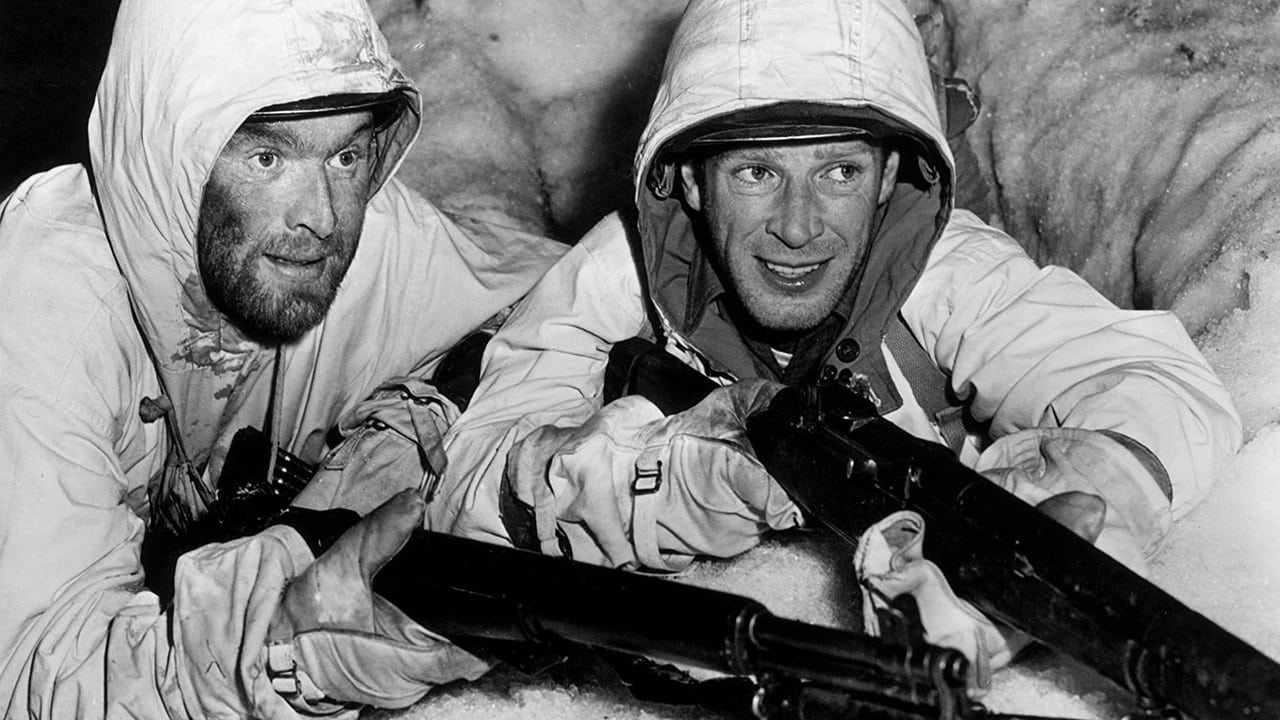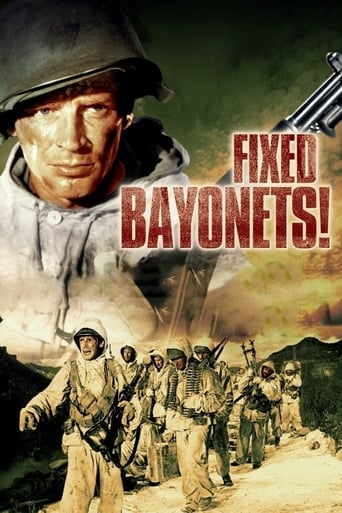

SERIOUSLY. This is what the crap Hollywood still puts out?
... View MoreI am only giving this movie a 1 for the great cast, though I can't imagine what any of them were thinking. This movie was horrible
... View MoreThis is a small, humorous movie in some ways, but it has a huge heart. What a nice experience.
... View MoreOne of the film's great tricks is that, for a time, you think it will go down a rabbit hole of unrealistic glorification.
... View MoreSamuel Fuller had fought in the Second World War and put his field experience to good use in directing this low budget film set in Korea during the Korean War. The story is simple. A major general in charge of an American division is forced to order a tactical retreat of his division across the only existing bridge over a major river, which he will then blow up behind him. In order to avoid the enemy massacring his 15,000 troops as they slowly make their way across that choke-point, the general decides to leave a small platoon of 48 soldiers behind, commanded only by a lieutenant, to make a lot of noise and fire a lot of weapons so that the enemy will not know for some time that the division has pulled out. This platoon, known as a 'rear guard', will thus buy time for the division, and then they can follow after a certain number of days, if they can. The action is set in the snow-covered and freezing mountain environment of that terrible war. (A friend who fought in it told me the worst thing was the cold, far worse than the fighting.) The action of the film is thus circumscribed within this narrow story, in a small mountain pass where 48 men face an entire enemy division complete with artillery. Richard Basehart plays a corporal who, as fourth in line of command, ends up becoming the commander of the platoon when the three men outranking him are all killed. He has an inner struggle about responsibility, and that part of the film is a psychological profile of a man who fears command and also cannot bring himself to fire a gun at another human being. So Fuller is driving home some important truths about what war really involves, namely killing people (a point often forgotten by politicians in their bubbles!) There is a tense scene where Basehart has to walk into a minefield to rescue someone, trying to feel gently through the snow with his boots where the mines might be. (The medic who had proceeded him in this effort had already been blown up by a mine.) I had a friend named Michael Scott who during the Second World War went into a minefield to save his friend Carlos Blacker, and lost an eye, so I have heard some first-hand accounts of this tricky subject. Early on in the film, when the enemy are firing artillery at the platoon, they blast away at a cliff and a rock-fall reveals a handy cave, in which the platoon is able to shelter from the cannon fire. I winced as I saw the soldiers knocking the stalagtites down inside the cave, despite one of the soldiers saying it had taken 2000 years for them to form. I know it was only a set, but the idea of damaged stalagtites offends my geological sense of the proprieties. This film was 'suggested by' a novel by the British author John Brophy. Brophy was from Liverpool, who also wrote a novel and screenplay for the film entitled WATERFRONT (1950), which tells a tragic tale of the Liverpool slums, from which Brophy presumably came himself. There is some good acting and a lot of grit in this simple war film, which concentrates on this small body of men and their struggle against the odds. The film has been restored and included in the 'Maters of Cinema' series on Blu-Ray, as part of the current revival of the films of Samuel Fuller, whose PICKUP ON SOUTH STREET (1953) is probably his best known film. I need hardly point out that 'fixed bayonets' refers to the time when close combat is at hand, and soldiers have to fix bayonets to the ends of their rifles to defend themselves against the enemy, as firing is no longer possible because the enemy is only a few feet away. Bayonet fighting is probably every soldier's worst nightmare, and it is not much different from what warfare was like a thousand years ago, i.e., two men struggling against each other to the death with only sharp blades to decide who lives and who dies. Makes you want to join the army, doesn't it?
... View MoreFIXED BAYONETS – 1951 This is not an antiseptic flag waving propaganda war film. It is a brutal, hard hitting piece about fear, and courage, among men who know they could die at any moment. Director Sam Fuller pulls no punches in this Korean War film from 1951.The US, UN and South Korean forces had pushed the North Korean Army back almost to the border with China. They were then caught off guard when Chinese Red Army forces attacked them. This soon forced a massive retreat along the whole front.This film is about a small group of American soldiers left behind to man a rear guard post. They need to make the Chinese believe that they are facing a much larger unit. The US unit needs to delay the Chinese for 48 hours to allow their own troops a chance to fall back and regroup.They chose a narrow pass through the mountains to base their defence on. They mine the approaches and set up a series of machine gun posts. Whenever the Chinese probe the defences, the American hit back hard and heavy, keeping the Chinese guessing as to the US unit strength.This tactic can only work for so long, as there are only 50 or so soldiers. First the LT. in charge, Craig Hill, is killed, then, the two senior sergeants, Michael O'Shea and Gene Evans bite the bullet. Command of the survivors, falls to Richard Basehart. Basehart is a former officer candidate who has a fear of giving orders.Forced to step up and take charge, Basehart fights his personal demons and does just that. He holds the post for as long as he can, then leads the survivors back to meet with the rest of the division.Except for a couple of scenes, the whole production was filmed on a sound stage. This does not distract from the film at all, there are plenty of well-staged battle sequences etc throughout the film. The action is down and dirty, with all looking like they have been put through a wringer. This is a gritty, well-made war film.The director, Sam Fuller also scored big a little earlier with another Korean War film, THE STEEL HELMET. Both these are well worth a look for war film buffs.
... View MoreOf all the war movies I have ever seen (some very good, some good, some less good and others, simply awful and preachy), this one, together with all his other "companions" (see "The Big Red One") is simply what one might expect, or better, should expect from a "war" movie. I put quotes around "war" because in reality, Fuller's movies of this genre are all but war movies. If you look deeper, you will see that they are actually anti-war movies at their best and absolutely not pontifying a message of peace, but rather depicting war and the men involved in it, as a total chaos, a slaughterhouse and a total misery for those who live it. Fuller's movies do not glorify war, but rather show the grittiness, the dirt, the shadows and the deepest darkness that surrounds and envelopes people who are in its midst. There are just a few others in his league, such as Peckinpah and John Irvin who managed to send the message home. Yet, sadly, there are still people "glorifying" war as a noble expression of human endeavor. Such people never understood a thing about war, or simply never served on active duty, in order to judge with their own eyes what war is really all about. Usually, such people sit comfortably behind a desk in a wonderfully padded armchair, or simply on a luscious couch, following Baseball or Football events and allow others to do their dirty work for them. "Fixed Bayonets!" is a crude, raw and unforgiving depiction of what common men are put through in a war situation. The Korean War might be just the excuse to do so, since every war, past, present and yes, even future, brings inexorably pain and death to those who fight it, as well as to those who wait back home, for a husband and father (today also a wife and mother), or for a brother, sister, son or daughter... Samuel Fuller's intention was always to bring reality into the game, but evidently, his message never got through to some, especially not to those hyper-thyroideal muscle men who believe that brawns alone will win you a war... In my book, this movie, together with all other Sam Fuller's work of this kind should a must see in schools everywhere. This would finally teach children what war is really like. But, said this, I just remember another movie, called "All quiet on the Western Front", in its two incarnations, one in 1930, and the other more recent, in 1979, which already dealt with the very same argument and what did those movies affect? Nothing. War is still among us. And so is the misery of our human condition. When will humanity listen to people like Fuller, Peckinpah, Irvin, Remarque and many others who lived through war and survived it? Oh sure, they are honored now... now that they are dead and cannot do too much harm to the war and death industry, but will there ever be someone who will actually manage to put the word "The End" to war? I seriously doubt it. In my view, this movie is simply a must for those who are seriously interested in studying war as a phenomenon, not just as a past time.
... View MoreThis Korean war(1951-1953) drama is the fare of American GIs in Korea early 1951 and stands as one of the best warlike film . A band of Chinese troops follows a soldiers group posing as a regiment. Then, they take refuge into a cave stronghold but the group is besieged. They simply do their best to survive a terrifying situation. But the superiors are murdered and the corporal Demmo takes command.The film is dedicated to the queen of battles-the United States Infantry. The producers give grateful thanks to the Department of the Army for its encouragement , advice and active cooperation in the preparation and production of this picture. The film is based on true events, a Chinese communist offensive formed by 350.000 soldiers who vanquished 8º Army commanded by Ridgway and withdraw across southern. Posteriorly, American Army and UN multi-national troops undergo a contra-offensive and retrieve lost territory until 38 parallel.This is a conventional story bolstered considerably by director Fuller's flair for warlike drama and action. Dark and thoughtful and hurriedly made, the movie gains strength as it goes on, and shows a tremendous grasp of the tale as an unit. Excellent performance by male leads, boasting and most restrained acting by Richard Basehart as the corporal taking the command responsibility. Top-notch Gene Evans as brave sergeant and excellent secondaries, Craig Hill, Skip Homeier, Michael O'Shea and appearance an uncredited James Dean. Samuel Fuller's most fluid and strongest film-making lies in his war pictures from ¨Steel helmet,Fixed bayonets, Merril's marauders, Hell and high water, and specially : Big red one¨ all are tremendously exciting and stirring. Rating : Better than average. Well worth watching.
... View More